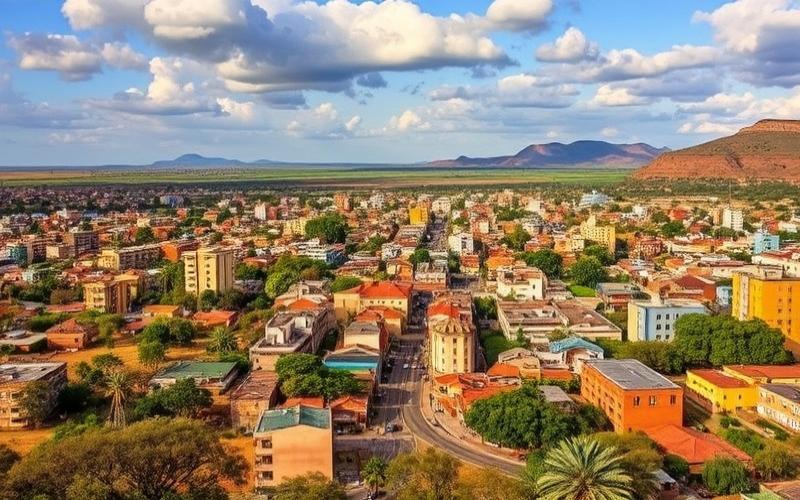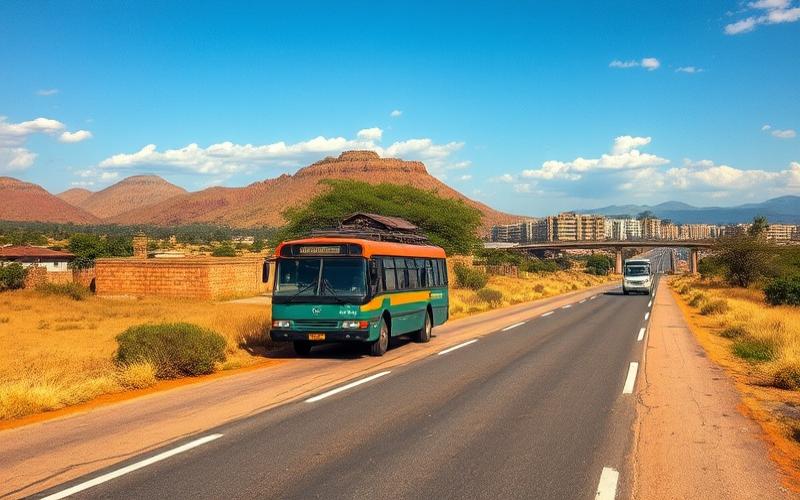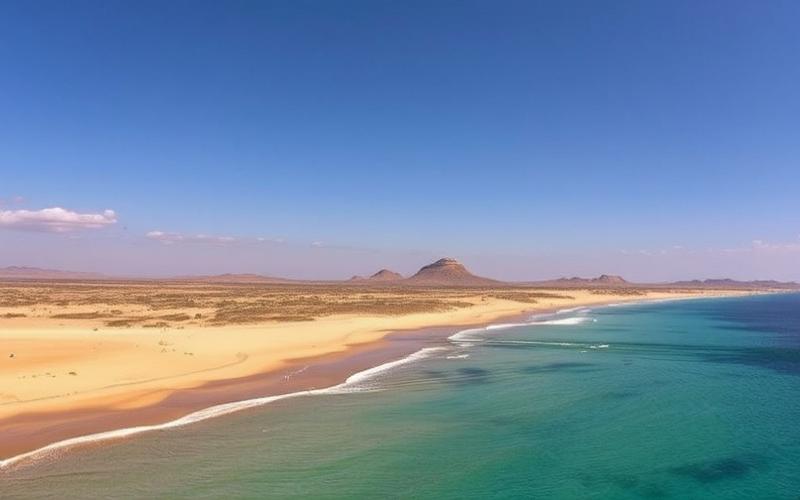
 Published on and written by Cyril Jarnias
Published on and written by Cyril Jarnias
Exploring Academic Horizons Abroad
Exploring academic horizons abroad proves to be a rewarding experience, and South Africa stands out with its unique educational offerings. By choosing this dynamic destination for higher education, one can expect immersion in an environment where teaching quality combines with fascinating cultural diversity.
South Africa, with its renowned universities and thriving specialized programs, attracts numerous international students each year eager to benefit from innovative pedagogy and an environment conducive to personal growth.
Moreover, the affordable cost of studies and living enables more students to achieve their academic dreams without breaking the bank.
For those seeking to combine academic excellence with cultural adventure, studying in South Africa can be an unforgettable academic journey that radically transforms their educational and personal path.
Exploring Higher Education Options in South Africa
Types of Higher Education Institutions in South Africa:
- Public Universities: They offer traditional university programs (bachelor’s, master’s, doctorate) in various fields. Among the most recognized are the University of Cape Town, University of the Witwatersrand, University of Pretoria, and Stellenbosch University.
- Technical Institutes and Universities of Technology: These institutions (for example, Cape Peninsula University of Technology, Durban University of Technology) focus on vocational, technological, and applied training.
- Private Colleges: Offer specialized training, often in business, computer science, arts, or management fields.
Scholarship Programs and Financial Aid for International Students:
- Scholarships specifically for international students are limited, and most financial aid is reserved for South African students.
- Some programs open to international students:
- Mandela Rhodes Scholarships: Cover tuition fees and part of living expenses for African master’s students, subject to admission and visa approval.
- Mastercard Foundation Scholarships: Primarily for African students, they cover studies and related expenses for programs at partner universities.
- Commonwealth Scholarships and other international programs: Accessible depending on country of origin and field of study.
- It’s recommended to contact universities directly to learn about specific scholarships they offer.
- Some scholarships require creating an online profile, submitting academic records, recommendation letters, and a career plan.
Language of Instruction:
English is the primary language of instruction in most South African higher education institutions.
Proficiency in English is therefore essential. Some universities require proof of competency (TOEFL, IELTS) during registration.
International Recognition of South African Degrees:
| Feature | Detail |
|---|---|
| International recognition | Yes, especially for major public universities |
| Verification procedure | SAQA (South African Qualifications Authority) may be required |
| Particularly recognized fields | Medicine, engineering, social sciences, law |
| Academic mobility | Partnerships with European, American universities, etc. |
Main Student Cities and Student Life Characteristics:
| City | Major Universities | Student Life Characteristics |
|---|---|---|
| Cape Town | University of Cape Town, Cape Peninsula University | Cosmopolitan city, rich cultural life, proximity to ocean and nature, temperate climate, strong international community |
| Johannesburg | University of the Witwatersrand, University of Johannesburg | Economic center, vibrant nightlife, cultural diversity, access to numerous internships and jobs |
| Pretoria | University of Pretoria, Tshwane University of Technology | Administrative capital, calmer atmosphere, numerous green spaces, dynamic student associations |
Administrative Procedures for Studying in South Africa:
- Obtaining a study visa: Required for all international students. The application must be made upon university acceptance, presenting an admission letter, proof of financial resources, and health insurance.
- Degree recognition: Some programs require validation of previous degrees by SAQA (South African Qualifications Authority).
- Language requirements: Proof of English proficiency (TOEFL, IELTS, or internal test depending on the university).
- Other formalities:
- Mandatory health insurance.
- Proof of accommodation.
- Evidence of sufficient funds to cover living and tuition expenses.
- Valid passport for the entire study period.
South Africa offers a diversity of higher education institutions, selective but quality scholarship opportunities, predominantly English instruction, and international degree recognition, particularly for major public universities. The main student cities provide varied and dynamic living environments, while administrative procedures require anticipation and rigor, especially for obtaining visas and proving language proficiency.
Good to Know:
In South Africa, explore various types of institutions such as public universities, technical institutes, and private colleges, with scholarships for international students and courses in English, mainly in Cape Town, Johannesburg, and Pretoria; don’t forget to verify international degree recognition and the process for obtaining a study visa.
Understanding the South African University System
Overview of Study Levels
- Bachelor’s degree: Typically obtained after 3 years of full-time study. There are also career-oriented degrees lasting 4 years. An Honours degree can be added in one year after the bachelor’s.
- Master’s degree: Lasts 1 to 2 years after the bachelor’s, with strong research or coursework components depending on the specialty.
- PhD: Lasts at least 2 years after the master’s, focused on research and writing a thesis.
Regulatory Framework and Accreditation Bodies
- Council on Higher Education (CHE): Oversees quality and accreditation of university programs.
- South African Qualifications Authority (SAQA): Manages recognition and standardization of qualifications.
- Department of Higher Education and Training (DHET): Responsible for regulating public and private higher education.
Diversity of Academic Programs
South African universities offer a wide range of programs in various fields:
- Social sciences, natural sciences, engineering, medicine, business, law, agriculture, viticulture, tourism, hospitality, sustainable development, mining professions, media, arts, and creative technologies.
Grading and Credit System
- Grading: System based on percentages. A score of 50% generally corresponds to passing.
- Credits: The National Qualifications Framework (NQF) system assigns credits to modules, similar to European ECTS. A bachelor’s degree totals approximately 360 NQF credits.
| Grade (%) | Classification |
|---|---|
| 75-100 | Distinction |
| 70-74 | First class |
| 60-69 | Upper second |
| 50-59 | Lower second |
| 40-49 | Third class |
Administrative Procedures for Expatriates
Procedures for Obtaining a Student Visa in South Africa
To study in South Africa, it’s essential to obtain a student visa before arriving in the country. This visa must be requested from the embassy, consulate, or VFS center in your home country.
Required Documents:
- Official acceptance letter from the South African university
- Passport valid at least 30 days after the intended departure date, with at least two blank pages
- Properly completed visa application form BI-1738 or BI-84
- Two recent passport photos
- Proof of accommodation in South Africa
- Recent medical certificate
- Police clearance certificate less than six months old from home country
- Proof of sufficient financial resources (bank statements, scholarship letter, sponsorship)
- Medical insurance valid in South Africa
- Round-trip flight ticket or proof of onward travel
- Yellow fever vaccination certificate (if required based on origin)
Timelines to Respect:
- The application must be submitted several weeks before the intended departure date (ideally 2 to 3 months in advance).
- Processing times vary from 4 to 8 weeks depending on periods and consulates.
Associated Fees:
| Procedure | Approximate Amount |
|---|---|
| Student visa | ~47 USD |
| SAQA equivalence | 120 to 200 € |
Registration with Local Authorities
Upon arrival, the student must register with the local immigration service. Registration in the foreign nationals register and obtaining a temporary residence permit are generally automatic with the student visa, but you may be required to report to the local police station or immigration office within 30 days of arrival.
Additional Formalities
Degree Recognition:
Foreign degrees must be evaluated by the South African Qualifications Authority (SAQA). Academic documents must be translated and certified in English.
Timeline: 4 to 8 weeks.
Cost: 120 to 200 €.
Certified Translation:
Translations must be done by a sworn translator.
English Language Test:
A TOEFL or IELTS test is generally required if the student is not from an English-speaking system.
Opening a Bank Account
Present passport, student visa, proof of university enrollment, and local address. Some banks require an initial deposit. A local bank account is necessary to receive scholarships, payments, or make daily transactions.
Health Insurance
Medical insurance is mandatory for all international students. It must be purchased from an accredited South African insurer or validated by the university. Provide proof during the visa application and university registration.
Summary of Main Procedures
| Procedure | Where to Complete | Key Documents | Estimated Time |
|---|---|---|---|
| Student visa application | Embassy/Consulate/VFS | See list above | 4-8 weeks |
| Degree evaluation (SAQA) | Online (SAQA website) | Translated and certified degrees | 4-8 weeks |
| Bank account opening | Local bank | Passport, visa, proof of enrollment | Few days |
| Local health insurance | Insurer or university | Insurance certificate | Immediate |
| Registration with authorities | Immigration office/police | Passport, visa, proof of address | Within 30 days |
Practical Tips
- Prepare certified copies of all important documents.
- Check passport validity (at least 6 months after intended return date).
- Keep digital copies of all supporting documents and forms.
- Anticipate timelines for degree equivalency, which can delay enrollment.
Useful Resources and Contacts
- Embassy or Consulate of South Africa in your country
- VFS Global Center for visa application submission
- South African Qualifications Authority (SAQA) for degree evaluation
- International office or foreign student welcome center of your chosen South African university
- South African Department of Home Affairs for any immigration-related questions
Note
Procedures may change; it’s recommended to regularly consult official websites and contact university welcome services for personalized assistance.
Good to Know:
To obtain a student visa in South Africa, prepare required documents such as proof of enrollment at a South African university and a medical certificate, and initiate procedures at least three months before departure; registration at the embassy and opening a local bank account are also highly recommended for easier integration.
Funding and Scholarships for International Students
Overview of Average Costs
- Tuition Fees: For international students, tuition fees vary by university and program:
- Stellenbosch University: 44,000 to 87,000 ZAR per year (undergraduate)
- University of Cape Town: from 56,000 ZAR/year (bachelor’s)
- University of the Witwatersrand: approximately 47,000 ZAR/year (bachelor’s)
- Cost of Living: The cost of living in South Africa is lower than in Europe or North America, but you must budget for accommodation, food, transportation, and miscellaneous expenses.
| University | Annual Tuition Fees (ZAR) |
|---|---|
| Stellenbosch | 44,000 – 87,000 |
| Cape Town | 56,000+ |
| Witwatersrand | 47,000 |
Main Scholarships for International Students
- South African Government Scholarships
- Relatively rare for non-residents, but some programs exist for African students under bilateral cooperation or NEPAD frameworks.
- University Scholarships
- Some universities offer scholarships to foreign students (e.g., University of Johannesburg, University of Pretoria).
- Foundations and International Organizations
- Mandela Rhodes Scholarship: Covers tuition fees, living allowance, and accommodation for African master’s students. Does not cover visa fees or degree authentication.
- Mastercard Foundation Scholars Program: Offers full scholarships for African students, managed by partner universities. Covers tuition, accommodation, living expenses, and sometimes travel costs.
- Canon Collins Trust: For postgraduate studies, variable amount based on needs and program.
- Commonwealth Scholarships: For citizens of Commonwealth member countries.
| Scholarship | Target Audience | Main Benefits |
|---|---|---|
| Mandela Rhodes | Africans, master’s | Tuition, living, accommodation |
| Mastercard Foundation | Africans, bachelor’s/master’s | Tuition, living, accommodation, travel |
| Canon Collins | Africans, postgraduate | Variable allowance |
| Commonwealth | Commonwealth | Tuition, allowance |
Common Eligibility Criteria
- African or Commonwealth nationality depending on scholarship
- Excellent academic results
- Commitment to community development or leadership (Mandela Rhodes, Mastercard Foundation)
- Prior admission to a South African university
- Ability to prove financial need (for some scholarships)
Application Procedures
- Submit an online application via the scholarship or partner university website
- Provide the following documents:
- Diplomas and transcripts
- Motivation letter
- Recommendation letters
- Proof of university admission (often required)
- Respect specific deadlines for each program
- Some programs require an interview or additional essay
Additional Financial Support
- Student Loans: Rarely accessible for international students, except through special agreements with certain institutions.
- Part-time Jobs: International students holding study visas can work up to 20 hours per week during academic periods and full-time during university holidays, subject to authorization on their visa.
Practical Tips for Managing Expenses and Maximizing Chances
- Begin funding search at least one year before the academic year starts.
- Prepare careful and personalized application files for each targeted scholarship.
- Target scholarships specific to your nationality or field of study.
- Prioritize university residence or shared accommodation to reduce costs.
- Use university advisory services to identify other funding sources and benefit from guidance.
- Maintain a rigorous monthly budget, anticipate hidden costs (visas, health insurance, educational materials).
- Be proactive in searching for work opportunities on or off campus, respecting student work legislation.
Key Takeaway:
Access to scholarships remains competitive and requires meticulous preparation of your application. The diversity of funding sources (scholarships, jobs, occasional aid) should be leveraged to optimize your academic journey in South Africa.
Good to Know:
International students in South Africa can benefit from scholarships such as those offered by the South African government or universities, often awarded based on academic criteria or financial need, while taking advantage of part-time work opportunities to alleviate living costs, which are generally more affordable than in many other English-speaking countries. To optimize your finances, establish a realistic budget considering average living costs and explore available student loans, while submitting your scholarship applications as early as possible to maximize your chances.
Disclaimer: The information provided on this website is for informational purposes only and does not constitute financial, legal, or professional advice. We encourage you to consult qualified experts before making any investment, real estate, or expatriation decisions. Although we strive to maintain up-to-date and accurate information, we do not guarantee the completeness, accuracy, or timeliness of the proposed content. As investment and expatriation involve risks, we disclaim any liability for potential losses or damages arising from the use of this site. Your use of this site confirms your acceptance of these terms and your understanding of the associated risks.
























































